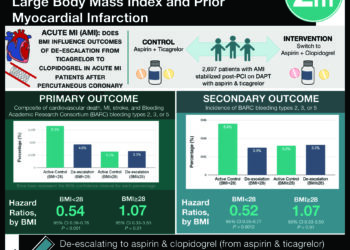Self questionnaires without physical exam a strong predictor of mortality
1. The strongest predictor of all-cause mortality in men was found to be self-reported health, which can be acquired without a physical examination, whereas the strongest predictor of all-cause mortality in women was a previous cancer diagnosis.
2. The strongest predictors of all-cause mortality were measures of smoking habits when individuals with major diseases or disorders were excluded.
3. A prognostic score developed in this study was accurate in predicting 5-year mortality risk using 13 predictors for men and 11 for women.
Evidence Rating Level: 1 (Excellent)
Study Rundown: Prediction of mortality using prognostic indicators is critical for accurate clinical decision-making. Utilizing data from the UK Biobank health database, this study aimed to investigate predictors of all-cause and cause-specific mortality during a 5-year period, and to create a prediction score for 5-year mortality using only self-reported information. Data from about 500,000 UK Biobank participants on 655 demographics, health, and lifestyle measurements were assessed for sex-specific associations with 5-year all-cause mortality and six cause-specific mortality categories utilizing the Cox proportional hazard model.
The strongest predictor of all-cause mortality in men was found to be self-reported health, which can be obtained without the need for a physical examination, whereas the strongest predictor of all-cause mortality in women was a previous cancer diagnosis. The strongest predictors of all-cause mortality were measures of smoking habits when individuals with major diseases or disorders were excluded. Finally, a prognostic index for 5 year-mortality calibrated for individuals aged 40-70 years was accurate in predicting health risk. This study’s prospective design with high rates of follow-up is a key strength of this analysis. The predictions this study makes must be interpreted with caution when applied across populations, due to similarity of the test cohort.
Click to read the study, published today in The Lancet
In-Depth [prospective cohort]: This prospective population-based study aimed to assess various predictors of mortality utilizing data from the UK Biobank database. Data from 498,103 participants aged 37-73 years, from England, Wales, and Scotland who were enrolled in the UK Biobank project from April 2007 to July 2010 were analyzed for sex-specific associations of 655 measurements of health, demographics, and lifestyle with all-cause mortality and six cause specific mortality categories. Variables missing in over 80% of participants were excluded from the analysis.
8,532 individuals (including 39% women) died during a median follow-up of 4.9 years. The strongest predictor or all-cause mortality in men was self-reported health (C-index including age 0.74 [95% CI 0.73-0.75]). The strongest predictor of all-cause mortality in women was to be a previous cancer diagnosis (0.73 [0.72-0.74]). Measures of smoking habits were the strongest predictors of all-cause mortality when individuals with major diseases or disorders were excluded (Charlson comorbidity index >0; n=355,043). A prognostic score based on 13 self-reported predictors for men and 11 for women achieved better performance than the Charlson comorbidity index (p<0.0001 in men and p=0.0007 in women) and good discrimination (0.80 [0.77-0.83] for men and 0.79 [0.76-0.83] for women).
Image: PD
©2015 2 Minute Medicine, Inc. All rights reserved. No works may be reproduced without expressed written consent from 2 Minute Medicine, Inc. Inquire about licensing here. No article should be construed as medical advice and is not intended as such by the authors or by 2 Minute Medicine, Inc.







